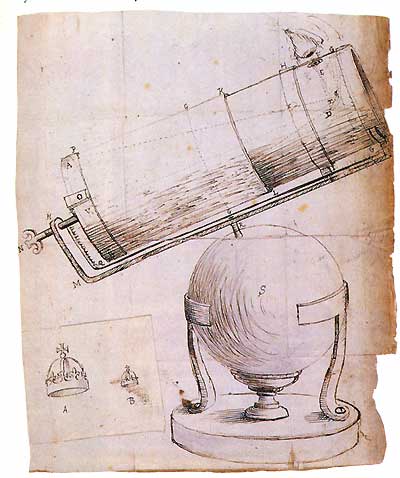The
Impact of Newton's Reflecting Telescope
Newton's Reflecting
Telescope
- Pros:
- His design was way ahead of its time but it
launched a new era of telescopes that became known as
the Newtonian telescope.
- His telescope was small. His first was only 6
inches long and 1 inch in diameter with 30x
magnification which was approximately equal to a 3-6
foot refracting telescope.
- His telescope did not suffer from chromatic
aberration because mirrors reflect light; they do not
absorb and bend it like glass lenses.
- Cons:
- Even though Newton made his own mirror out of a
metal alloy of copper and tin his telescope suffered
from poor image quality because of the low quality
mirrors. The mirrors would quickly tarnish and need to
be re-polished several times a year.
- Spherical aberration remained. Newton knew the spherical shape of the mirror caused it but he lacked the technology to make a parabolic mirror and a sphere was the easiest to grind.
- Newton's mirror only reflected 16% of the light so refractors still produced brighter images.
- Newton made three reflecting telescopes but they
were not used much. He built them more to prove his
ideas about telescopes, optics, and white light.
The Reflecting Telescopes Impact
- Both refracting and reflecting telescopes were
plagued with problems and the refracting telescope would
probably have given way to the reflecting telescope due
to its practical nature and small size but lens quality
greatly improved in the early 1700s. After that it was a
battle between which was better, both of them had their
pros and cons but technical advances overcame them.
Refracting telescopes reached their peak in the late
1800s because of the size constraints of the lens. 40
inches was the maximum size of a lens due to the
constraints of the physical properties of the glass.
This is when reflecting telescopes became more popular
because high quality mirrors were now available and
could be produced at greater size and less cost than the
lenses of refracting telescopes.
|
Drawing
of Newton's Telescope
 |
| Home |
Early Telescopes |
Limitations
|
Impact | Bibliography |